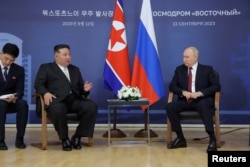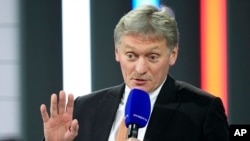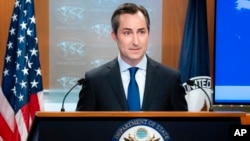The future of international efforts to restrain Pyongyang’s nuclear weapons program is in question after Russia voted on Thursday to dismantle a body meant to monitor the implementation of United Nations sanctions against North Korea.
Since its creation in 2009, the so-called “Panel of Experts” has played a key role in attempts to enforce U.N. Security Council resolutions against North Korea. Most notably, the eight-member panel produced regular reports outlining alleged violations of U.N. sanctions, keeping the issue in the public eye and prompting follow-up reporting by independent news outlets.
Though Security Council cooperation on North Korea had already eroded, and North Korea has steadily found ways to evade existing sanctions, the dismantling of the expert panel could remove remaining barriers to North Korea’s weapons program and undermine global non-proliferation efforts.
How did we get to this point?
The Security Council first imposed sanctions on North Korea following its initial nuclear test in 2006. It expanded the measures as North Korea ramped up illicit weapons development in subsequent years.
As permanent, veto-wielding members of the Security Council, Russia and China voted for the North Korea sanctions. But as their respective ties with the United States deteriorate, both countries are calling for sanctions to be eased or lifted, leading to questions about whether the expert panel will survive.
During recent negotiations, Russia and China pushed to add “sunset” clauses to at least some of the North Korea sanctions, which would allow them to expire after a fixed amount of time if a consensus is not reached on their extension, according to several media reports.
With those efforts having apparently failed, Russia on Thursday voted against renewing the annual mandate of the expert panel, while China abstained from the vote. Without unanimous support, the panel’s mandate will expire on April 30.
Why did Russia kill the UN sanctions panel?
For years, Russia has argued that the North Korea sanctions are outdated and counterproductive. In Moscow’s view, not only did the sanctions fail to persuade Pyongyang to give up its nuclear weapons, they instead created a humanitarian crisis in the country.
U.S. officials disagree, saying North Korea is to blame for spending vast sums of money on weapons rather than food for its people.
In recent years, Russia has grown bolder about conducting activities that may explicitly violate U.N. sanctions. Most notably, U.S. officials say Russia has imported at least 10,000 containers filled with North Korean munitions, including ballistic missiles, for use in its war in Ukraine.
Both Russia and North Korea deny the weapons transfers, despite mounting evidence in the form of commercial satellite photos appearing to show repeated deliveries of North Korean weapons.
Britain’s Financial Times newspaper this week reported that Russia also started supplying oil directly to North Korea in defiance of U.N. sanctions. In 2017, the Security Council imposed a strict limit on the amount of oil products North Korea can import.
By effectively killing the panel, Russia may be trying to make it easier to hide its sanctions-violating activities with North Korea, suggested U.S., South Korean and other Western diplomats who made public statements after Russia’s Thursday vote.
“This is almost comparable to destroying a CCTV (closed circuit television) to avoid being caught red-handed,” said Hwang Joon-kook, South Korea’s ambassador to the United Nations.
Russia itself has hinted at selfish motives. Asked Friday whether the vote means Russia has changed its policy regarding enforcement of U.N. sanctions, Kremlin spokesman Dmitry Peskov said, “Such a position is more in line with our interests. The talk was about a group of experts. The issue is that we do not agree with the practical aspects of this project.”
Will this move make it easier for North Korea to evade sanctions?
Possibly, according to many Western diplomats and analysts. One reason: The effort to gather and disseminate information about sanctions evasion could become more complicated.
Expert panel reports included “vast amounts of exclusive information from member states … as well as correspondence, photos and data obtained through panel communication with relevant parties,” Chad O’Carroll wrote on NK News, a North Korea-focused website he founded. “In many cases, journalists, private companies and individual governments lack the authority or clout to secure such materials.”
In the absence of the expert panel, Washington and its allies are vowing to find workarounds. At a briefing Thursday, State Department spokesperson Matthew Miller said the United States will continue to work to secure information about North Korea’s “pursuit of illegal weapons.”
“And we will continue to work to make that information public and make it available to other members of the Security Council,” Miller added.
Earlier this week, the United States and South Korea announced the formation of a task force meant to prevent North Korea from obtaining oil in violation of U.N. sanctions, which are imposed indefinitely.
Trilateral cooperation among the United States, Japan and South Korea may also increase, according to Leif-Eric Easley, a professor at Ewha University in Seoul.
“And more evidence of sanctions violations could be released to the public since the restraining influence Russia and China had over headline-generating reports will be gone with the U.N. panel of experts,” he added.
However, it is not clear if those smaller initiatives can replace the pressure created by a unified Security Council. If they cannot, many fear North Korea will more easily find the financial means to accelerate its nuclear buildup — perhaps even emboldening other countries to follow its example.
Hwang, the South Korean ambassador, said Russia’s vote represents a setback to the international non-proliferation regime.
“A permanent member of the Security Council and depository of the non-proliferation treaty completely abandoned its responsibility,” he said.



